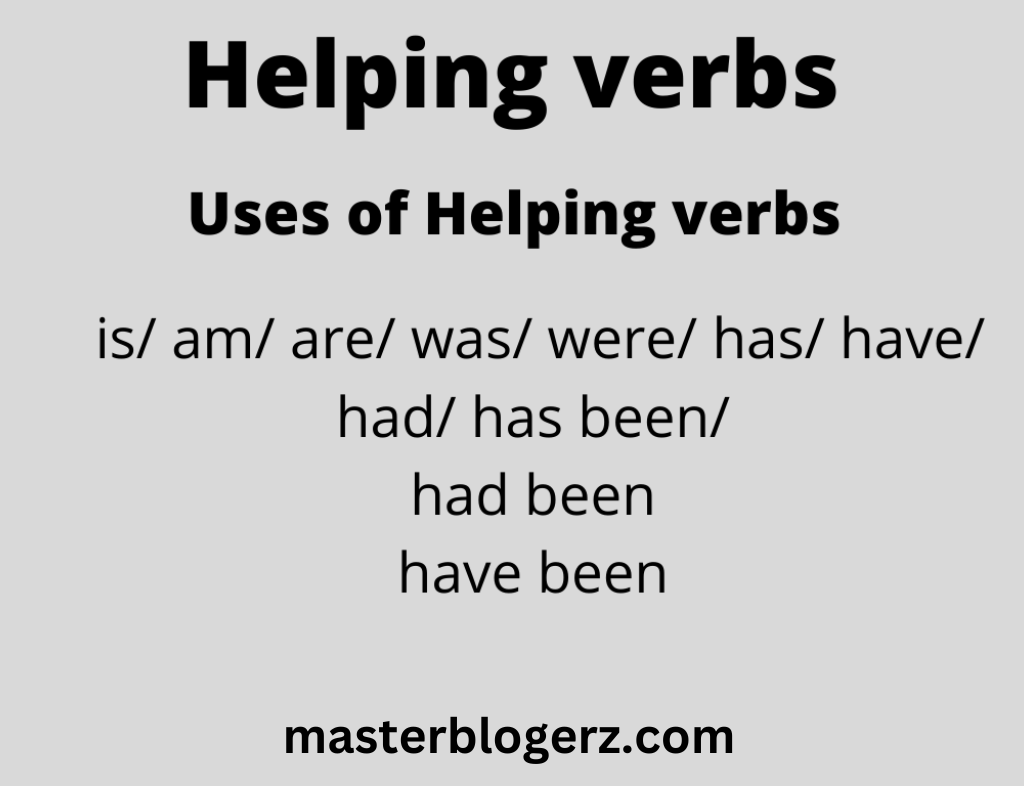Table of Contents
Helping Verbs:
Helping verbs, also known as auxiliary verbs, play a crucial role in English grammar. They assist the main verb in forming different tenses, moods, and voices, thereby adding depth and precision to our sentences. Understanding the correct use of helping verbs can significantly enhance your English language skills. In this article, we’ll delve into the importance of helping verbs, explore their various types, and provide practical examples to help you master their usage. Whether you are a student, a teacher, or simply looking to improve your grammar, this guide to helping verbs will prove to be an invaluable resource.
Uses of is/ am/ are/ was/ were/ has/ have/ had/ has been/ had been/ have been
First of all, we have to understand the concept of (BE)
(BE) in Urdu means (Hona) khush Hona + Naraz hona, etc.
We use (Be) to present or to show quality or to show state or happened
Note:
Now for the Present, we use:
ISà as a singular and AREà as a plural and every time when AMà is come so we use (I) as well.
While for past:
WASà as a singular and WEREà as a plural
Example:
If we do not use helping verb so the sentence would be…
- I be happy****
And of course it wrong. Now in order to write the correct sentence we have to use helping verb.
For example:
I am very happy
Who is this?
Both of them are in the room
Now starting from the very 1st helping verb…
1) Uses of is/ am/ are/
We use these to show state or existence
For Example:
He is sad
You are a doctor
We are your friends
- For Present continuous we use
She is reading her lesson
What are you reading?
- For Passive voice we use
Roshni is taught by her mother
We are supported by you
2) Was/ were/
We also use these to show state or existence but in past…
Note:
WASà is used in 1st person and 3rd person singular (I, HE, SHE, IT) while WEREà is use second person singular and plural (YOU, YOUR, YOURS).
Example:
He was sad
You were a doctor
We were your friends
- For Past continuous we use
She was reading her lesson
What were you reading?
- For Passive voice we use
Roshni was taught by her mother
We were supported by you
- Conditional sentences
Conditional sentences means Unreal` or (jhoot) in Urdu
Structure:
If + sub + was/were + object
Note:
We use (were) for impossible things.
We use (was) for possible things.
Example:
- If I were a rich man, I would make more charity.
- If he were right now, he would help us.
- If I was rude to you, I apologize
3) Has/ have/ had
1) (Auxiliary verb) or (helping verb)
We use these to show possession or ownership (malkana Haq) à in Urdu
Structure:
Sub + has/ have/ had + object
Note:
(For past we use had & for present we use has/have)
Example:
- I have a car.
- She has 2 brothers.
Conclusion:
Understanding helping verbs is important for improving your English grammar. These verbs support the main verbs to form correct tenses and moods, making your sentences clearer and more expressive. By learning how to use helping verbs properly, you can write and speak more accurately and effectively. Keep practicing, and you’ll get better at using helping verbs, which will make your English sound more natural and polished. Remember, helping verbs are key tools that can greatly enhance your communication skills.

Looking for a fast and efficient way to resize ICO files? is the perfect tool for web developers and designers.